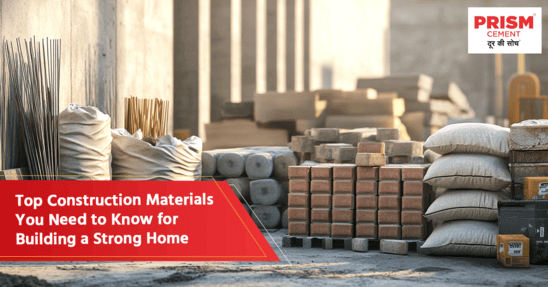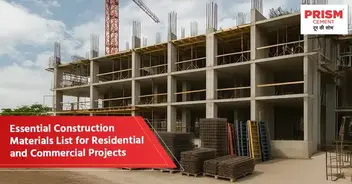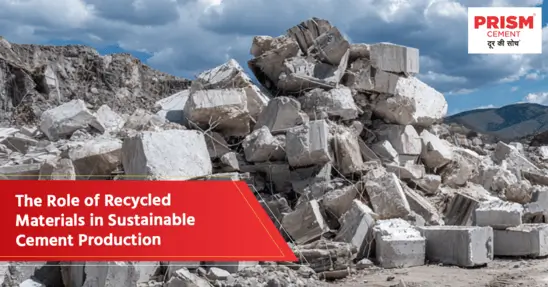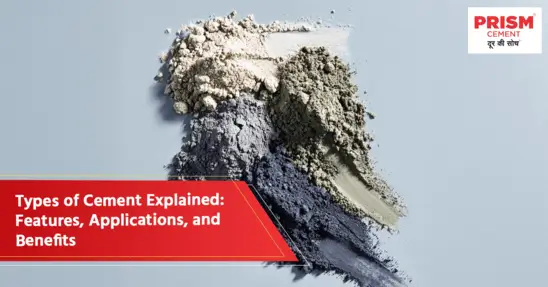Building your dream home is not just about stately design, it’s about choosing the right construction materials that form the backbone of a strong, durable, and beautiful structure. Whether you're starting from the foundation or planning the final changes, the choice of building materials plays a crucial role in the overall integrity and lifespan of your home. From concrete to steel, each material contributes to how your house performs under different weather conditions, loads, and times.
Understanding these building construction materials is key to making smart, long-term decisions. Let’s explore the most essential materials every homeowner should know about during construction work.
1. Concrete – The Backbone of Modern Homes
Why Concrete Matters?
When it comes to construction materials, concrete is among the most essential. It supplies compressive strength, durability, and stability. High-quality concrete ensures that your structure stands firm for decades. It forms the base of foundations, columns, slabs, and beams.
What makes concrete incredibly powerful is its ability to resist moisture, fire, and even the passage of time. It acts as a shield against structural decay when reinforced and cured properly.
Types of Concrete
There are several types of concrete used in construction work, including:
- Plain Cement Concrete (PCC) – Used for leveling and base work.
- Reinforced Cement Concrete (RCC) – Commonly used for beams, columns, and slabs.
- Precast Concrete – Used in modular construction for faster execution.
For residential building construction, the focus is on RCC, as it delivers strength and flexibility when combined with high-quality steel.
2. Steel – Strength and Structural Integrity
Benefits of Using Steel in Home Construction
Steel is one of the most reliable construction materials due to its tensile strength and flexibility. It supports the structural frame of your home, especially in earthquake-prone or high-wind areas. It pairs excellently with concrete, allowing your home to manage various stresses and loads.
Using steel in your building materials also allows for slimmer designs without compromising strength. It speeds up construction.
Where Steel Is Commonly Used?
- Reinforcement bars (rebars) in beams, slabs, and columns
- Roof trusses and frameworks
- Staircases, balconies, and support structures
Investing in high-quality steel may slightly increase your construction cost, but it significantly boosts your home's strength and safety.
3. Bricks and Blocks – Time-Tested Materials
Types of Bricks and Blocks
Bricks and blocks are still the go-to building construction materials for walls and partitioning. Their long-standing reputation for thermal insulation, durability, and load-bearing ability makes them an integral part of home construction.
Popular options include:
- Clay Bricks – Traditional, breathable, and widely available
- Fly Ash Bricks – Eco-friendly and used in modern construction
- Concrete Blocks – Larger, lighter, and provides better insulation
Each type brings unique benefits depending on the building construction types and regional climate.
Advantages of Bricks and Blocks
- Thermal insulation to keep your home cooler
- Fire resistance
- Easy to use and cost-effective
- Acoustic insulation in urban settings
Proper use of these materials helps in balancing construction costs and long-term benefits.
Conclusion
Selecting the right construction materials is the foundation of a safe, strong, and long-lasting home. From concrete that holds everything together, to steel that supplies a strong skeleton, and bricks & blocks that shape your living spaces, each material plays a key role in figuring out the performance of your home.
For regions facing seasonal challenges such as heavy rain or humidity, it's important to choose materials that offer added protection. That’s where Prism Champion All Weather Cement makes a real difference. With water-repellent properties, crack resistance, and rust protection, it helps keep your home structurally sound and visually beautiful, Har Mausam Mein Saath.
So, before you complete your plans, use a construction cost calculator to compare budgets and choose materials that not only suit your house type but also your long-term vision—because building a home is not just a project, it’s a legacy.
FAQs
Q1. What are the most essential construction materials for building a strong home?
Answer: The most essential materials include concrete, steel, bricks and blocks, and high-quality cement such as Prism Champion All Weather Cement. Each plays a crucial role in structural strength, safety, and durability.
Q2. How can I tell if a construction material is high quality?
Answer: Check for ISI certification, brand reputation, and specific technical qualities such as compressive strength, workability, and moisture resistance. Trusted brands meet with BIS requirements.
Q3. How does the quality of construction materials affect the longevity of a house?
Answer: Poor-quality materials can lead to cracks, seepage, corrosion, and structural failure. High-quality building materials ensure stability, reduced maintenance, and increased life span.
Q4. What are the latest innovations in construction materials for stronger homes?
Answer: Innovative construction materials include water-repellent cement, eco-friendly fly ash bricks, and fiber-reinforced concrete. Brands like Prism Cement are leading with moisture-resistant and maintenance-free solutions.
Q5. Which construction materials are best for earthquake-prone areas?
Answer: Use RCC concrete, high-grade steel, and flexible masonry blocks. Combining strength with flexibility helps absorb seismic shocks. Ensure materials meet seismic safety standards.




